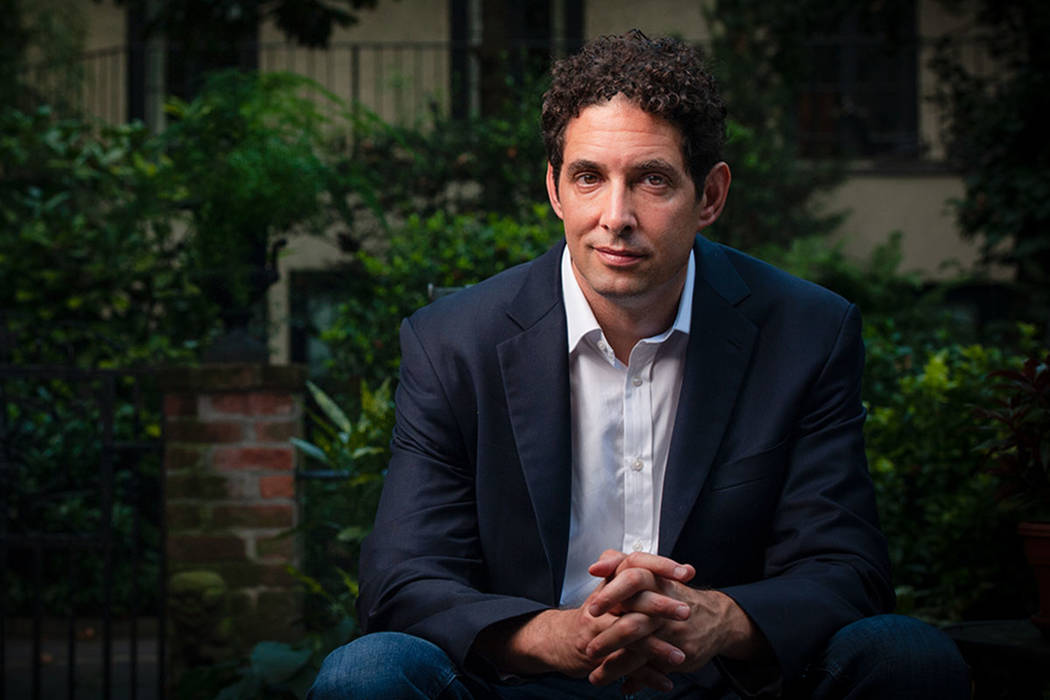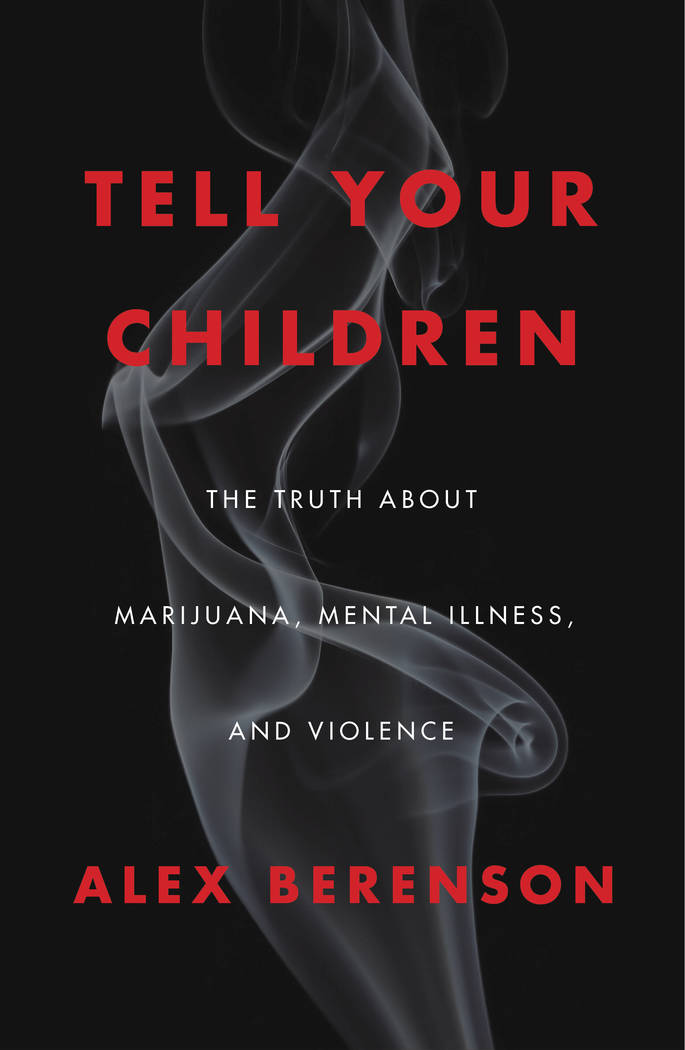New book ignites debate on health effects of marijuana
Author Alex Berenson chose to give his latest book a provocative title, one that played off the 1936 film “Tell Your Children” — later known as “Reefer Madness.”
The former New York Times reporter and author of award-winning spy novels settled on “Tell Your Children: The Truth about Marijuana, Mental Illness and Violence” (Free Press, $26). But researchers and medical clinicians say the science doesn’t support his premise: that marijuana use can cause schizophrenia and violence.
“The title is sort of twofold,” the New York-based Berenson says. It reflects the controversy that he knew would come from his book. “But it also is meaningful. I wanted people to be able to talk to their kids about the evidence, and if they’re honest with kids, that can change their behavior, like changing behavior about cigarette smoking,” he says.
The seeds of an idea
The book’s genesis lay in a conversation with Berenson’s wife, a forensic psychiatrist, about someone who had committed an act of violence. His wife, Berenson writes in the book, “said something like, ‘Of course he was high, been smoking pot his whole life.’ “
“She saw a lot of these cases,” he says. “I was skeptical. I probably said it sounds like ‘Reefer Madness.’ ” But after looking at the evidence, “I found it to be overwhelming. I had covered the drug industry and had written about drugs for mental health, and yet I didn’t really believe until I looked at the science.
“Dozens of well-designed studies have linked marijuana with psychosis and schizophrenia,” Berenson says. While most people never will have a psychotic episode from smoking marijuana, he writes, some will experience temporary episodes and “an unlucky minority of users will develop full-blown schizophrenia.”
“Start with the fact that psychosis is a serious risk for violence,” he says. “If they are taking their anti-psychotic medications and are being healthy and not using recreational drugs, most of that risk goes away. … The flip side is if those people are using recreational drugs, their risk is off the charts.”
He says cannabis is a drug that can provoke paranoia and delusions even in healthy people.
Berenson cites a 2017 report by the National Academies of Sciences, Engineering and Medicine that reviewed thousands of cannabis studies. According to that report: “There is substantial evidence of a statistical association between cannabis use and the development of schizophrenia or other psychoses, with the highest risk among the most frequent users.” The report offers the caveat that “the relationship between cannabis use and cannabis use disorder, and psychoses, may be multidirectional and complex.”
A key distinction
Critics of Berenson’s book argue that he confuses association with causation. One of the authors of the 2017 Academy of Sciences study tweeted that “We did NOT conclude that cannabis causes schizophrenia. We found 1) an #association between cannabis use and schizophrenia …”
It’s a key distinction, says Carl Hart, chairman of the psychology department at Columbia University, whose research includes studying the effects of psychoactive drugs on humans. Berenson’s “point is that cannabis causes psychosis disorder. There is absolutely no evidence to show that,” Hart says.
Of Berenson’s linkage of cannabis and violence, Hart says, “I have never seen it, frankly, and this is me studying people day after day, year after year.”
Dr. Dale Carrison, a former FBI agent, sheriff’s deputy and former head of the ER department at University Medical Center in Las Vegas says, “If you have some mental illness lurking in the background, even if it’s not active, and take any kind of drug, there is that potential for that drug making mental illness worse.” But in all his years as a police officer and an ER physician, Carrison says, “I haven’t seen anybody on marijuana get violent.”
As states continue a nationwide push toward legalizing medical and recreational marijuana use, medical professionals wrestle with what is and isn’t known about its effects. In May, 43 doctors, psychiatrists, mental health organizations and practitioners in Massachusetts signed a “statement of concern” about “how marijuana policy is shaped” in that state. The Massachusetts Prevention Alliance, which promotes “laws and policy that support prevention measures to reduce substance abuse and addiction,” coordinated and supported drafting of the statement.
The letter cites as potential negative effects of legalization, addiction and “increased risk of serious mental health problems, including acute psychosis… paranoia, schizophrenia, depression, anxiety and suicide.” It notes that “just as not all tobacco use causes cancer, not all marijuana/THC use causes the negative effects. However, the risk is substantial enough to require policies which discourage use.”
More research needed
A January study published in The Journal of Neuroscience concluded that even a small amount of cannabis use by teenagers is associated with changes in their brain, especially the amygdala, which handles “emotion-related processes” and in the hippocampus, “involved in memory development and spatial abilities.”
Another study by Canadian researchers published in 2018 in the American Journal of Psychiatry found that the effects of marijuana on teenagers’ ability to reason appear to be stronger than the effects of alcohol.
Many agrees that more studies on marijuana would be beneficial. But research is hampered in the U.S. because marijuana is classified as a Schedule 1 drug, meaning it has “no currently accepted medical use” under federal law.
“It’s just very hard for us to get good data on anything because of the Schedule I issue,” says Sarah Feldstein Ewing, professor of psychiatry at Oregon Health & Science University, and a committee member of the 2017 report. “No other country has this limitation. It’s something that’s really hamstringing us.”
Meanwhile Berenson continues to argue that the risk is real and that consumers — particularly adolescents, those who suffer from paranoia, panic attacks or schizophrenia or those with a family history of mental illness — “probably should not use it.”
Contact John Przybys at jprzybys@reviewjournal.com or 702-383-0280. Follow @JJPrzybys on Twitter.
FDA holds hearing on CBD
The Food and Drug Administration has taken the first steps toward looking at regulating CBD.
On May 31, the U.S. Food and Drug Administration held its first public hearing on the safety and effectiveness of products that contain cannabis or cannabis-derived compounds.
According to the FDA, the cannabis plant contains more than 80 "biologically active compounds," including THC, which provides marijuana's psychoactive effects, and cannabidiol, or CBD, which does not.
CBD often is an ingredient in lotions or edibles that manufacturers claim can alleviate medical ills from anxiety to muscle pains. However, the FDA says some companies "are marketing products containing cannabis and cannabis-derived compounds in ways that violate federal law" or put consumer safety at risk. A decision is not expected at this time.





























